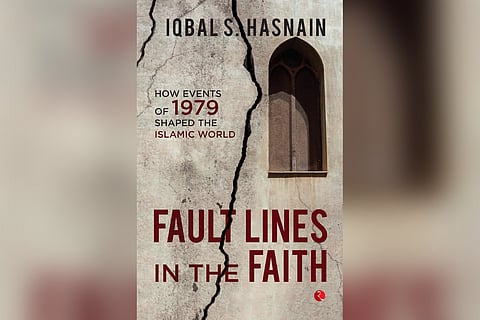

The year 1979 witnessed three apocalyptic events in the Middle East that shaped the contemporary Muslim World. The first was the Iranian Revolution led by Ayatollah Khomeini. The second was in November with the seizure of the Grand Mosque in Mecca by Juhayman al-Otaybi, a Saudi militant, who had overthrown the Saudi royal regime. And, the third was the Soviet Union’s invasion of Afghanistan, and the subsequent the arming of the Islamists in the country by the US in its fight against the Soviet Union.
Iqbal S Hasnain’s new book Fault Lines in the Faith, which deals with each event in great detail, while attempting to understand what plagues the Muslim world today. Using scholarly research methods, the author examines the occurences, drawing from authentic sources to construct a comprehensive and clear understanding. Hasnain employs a scientific methodology to analyse their development, causes and consequences, thereby providing a thorough examination and interpretation of the repercussions of these events in various Islamic countries.
The first chapter analyses how Wahhabism works as an ideological source of global Jihad. It throws light on the early history of Saudi Arabia from a religious and political angle, and explains how a pact between Abd al-Wahhab and Ibn Saud, founder of the Kingdom of Saudi Arabia in 1744, mutually helped them achieve their larger ends. It is maintained that today Muslims globally are facing the consequences of a decision taken by Saudi Arabia in 1979, to promote the strident Wahhabi Islam by marginalising a more tolerant strain of Sufi Sunni Islam.
Hasnain goes on to talk about the sectarian fault lines of the Muslim world, and how it has shaped the future of the Middle East. He looks at the changing political equations between the major economies of the region, and how Israel was changing the matrix by uniting Arab monarchies against Iran.
The title of the book holds a significant meaning. It highlights the Muslim world’s inability to halt its current trajectory and regain control for sustainable development. This is essential for societies to achieve their goals and address pertinent issues that affect both society and state in the Islamic world as a whole. The present situation is steering Muslim societies in different directions, resulting in a loss of control and damage to the societal fabric, which, in turn, has been destabilising many states, particularly in the Middle East. The region is grappling with fundamental, violent and unstable problems that impede its progress and often lead to a near collapse of the state apparatus.
Hasnain’s book is an important work that exposes how extremist outfits, with the support of the religious apparatus methodically managed to scar the face of a faith that claims to have the second largest number of followers in the world.
Fault Lines in the Faith
By: Iqbal S Hasnain
Publisher: Rupa
Pages: 320
Price: Rs 395